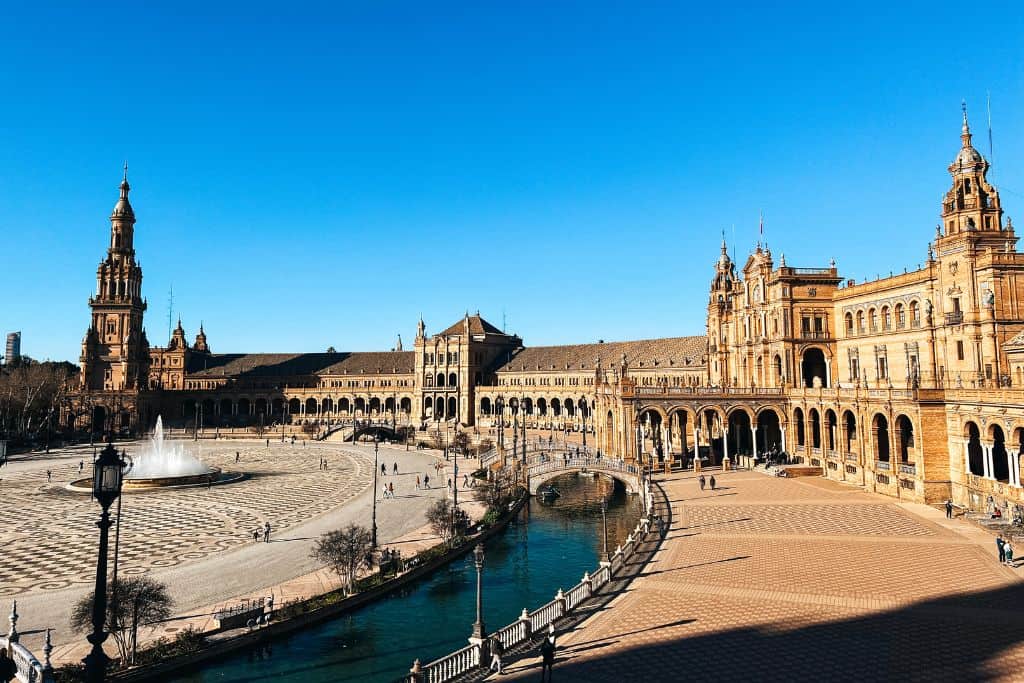Do They Speak English In Spain? Should You Know Spanish?
Are you wondering if they speak English in Spain?
Spain is easily one of the most famous gems in Western Europe. Its blend of rich history, versatile landscapes, and culture attracts millions each year. This is one country that you have to visit while in Europe!
When I was planning my first trip to Spain, one question I asked myself was how much English would be spoken in the country.
Traveling to a foreign country and not knowing the language can be challenging. Luckily, I had taken Spanish lessons, but my skills were still very basic, and I was concerned about barriers.
Luckily, if you are worried, they do speak English in Spain. However, it is not within the same proficiency as in the United States.
Understanding the prevalence of English spoken in Spain and familiarizing yourself with the country’s official language can go a long way. Learning a handful of Spanish phrases can significantly enhance your experience and cultural immersion.
This post will go into depth about which languages they speak in Spain, the English proficiency in the country, basic phrases to use, and other info you should know before visiting.
Going On A Trip To Spain? Check Out These Resources!
🛌 Accommodations: I always use Booking.com for my lodging.
🚘 Car Rentals: To find the best prices, I use Discover Cars!
✈️ Flights: To find great flight prices, I check on Skyscanner.
📍Tours: I use Viator to find memorable experiences.
Do They Speak English in Spain?
To quickly provide an answer to this question, yes, they do speak English in Spain.

As of the 2023 EF English Proficiency Index, Spain is a country with moderate English proficiency.
Ranked 35th overall, Spain is tied with Italy in proficiency but falls behind Germany and the Netherlands. Despite this, Spain is still an excellent country for English-speaking travelers to explore.
Out of Spain’s population of nearly 50 million people, a little less than one-third can speak English proficiently. While this might seem alarming, a higher concentration of English speakers is in major urban centers and tourist hotspots.
Considering this, is it necessary to be fluent in Spanish when visiting Spain? No, fluency in Spanish is not a requirement, but knowing the fundamental greetings and phrases is a respectful gesture. Nonetheless, you will likely have minimal difficulties encountering locals who can converse in English.
What Languages Do They Speak in Spain?
Spanish (Castilian Spanish) is Spain’s national language, with an estimated 90% speaking Spanish as their first or second language.
Regarding the country’s foreign languages, English, French, and Romanian are the top three in proficiency. English is the most widely spoken foreign language in Spain.

While Spanish is the chief language spoken across the country, the autonomous communities in Spain have co-official languages as well. This is due to various historical and regional reasons throughout centuries. Before the unification of Spain’s kingdoms in the 15th century, the different regions had distinctive languages.
The other official languages spoken across the autonomous communities are Catalan in Catalonia, Galician in Galicia, and Basque in the Basque Country. Valencian is also spoken in Valencia, and Catalan is spoken in the Balearic Islands.
If you wish to live in any of Spain’s autonomous communities, it will be beneficial to learn these regional languages in addition to Spanish. Not only will this assist your cultural immersion, but locals will also appreciate it.
In addition to these, there are even more minority languages and dialects spoken across Spain! Some include Asturian, spoken in Asturias; Aragonese, spoken in Aragon; and Extremaduran, spoken in Extremadura.
Spain English Speaking Percentage
Around 27% of the population in Spain can speak English. This English-speaking proficiency stands much lower than in other European countries like Malta and The Netherlands.
Despite Spain not being the most English-proficient country, there have been efforts to increase this. One way is English instruction starting earlier in school to increase skills within the younger population. Bilingual programs and online resources have also helped improve Spain’s English proficiency.
Can You Travel in Spain Only Speaking English?
Absolutely! You can visit Spain even if you are only fluent in English. When exploring Spain, you’ll discover that speaking Spanish is not obligatory, especially in popular tourist destinations, where you’ll encounter more English speakers.

These areas include popular cities like Madrid and Barcelona. Particularly within the hospitality and tourism sectors, there is a more widespread comprehension of the English language. While you will run into non-English speakers, you are more likely to run into those who know English.
👉TRAVEL TIP: One great resource to help with language barriers in foreign countries is Google Translate. There’s even the option to download offline languages to assist on your trip.
However, when visiting a foreign country, learning some of the most common phrases is always a respectful gesture. Not only will locals appreciate it, but it may also help if you speak to someone who doesn’t know English and is around less touristy Spanish destinations.
Spanish is also one of the easiest languages for English speakers to learn due to their similarities. You can even apply what you know when visiting other Spanish-speaking countries worldwide.
Basic Spanish Phrases to Use During Your Visit
If you’re preparing for your Spain trip and aim to enhance your Spanish language comprehension, the plus is that learning basic Spanish expressions is pretty simple. Furthermore, knowing these phrases will enrich your interactions with the local population and overall experience.

One of the most intimidating features of learning Spanish for English speakers may be the grammar and pronunciation; however, this all comes with time! Numerous words are even spelled very similarly.
Next are some Spanish words and phrases that might help your travels throughout Spain:
1. Hello- Hola
One of the most essential terms to be familiar with while traveling to a foreign country is “hello.” Fortunately, the Spanish word is simple.
This is a straightforward word to use while communicating with others in Spain. “Hello” is pronounced as OH-LAH in English. Make sure that the “h” is silent, as this letter is almost always silent in Spanish.
2. Bye- Adios
Like “hello,” “bye” is another easy yet important word to know as it demonstrates a respectful farewell in social settings.
You can pronounce “adios” as AH-DEE-YOHS. Generally, “adios” is the more formal way of bidding farewell. If you want to sound more casual, you can say “hasta luego,” which translates to “see you later.”
3. Thank You- Gracias
“Gracias” is one of the best expressions to show gratitude. In return for using it, locals will acknowledge your engagement with their culture.
To say “thank you” in Spanish, pronounce it as GRAH-SEE-AHS. The “r” in Spanish is pronounced similarly to the letter “d” but is more of a “tt” sound like in the word “little.” While that’s certainly different from English, it’ll become natural after practice!
3. You’re Welcome- De Nada
“De nada” is an additional simple Spanish term to use. It’s a way to respond with “you’re welcome” and is a nice way to show politeness.
To express “you’re welcome” in Spanish, say it as DEH-NAH-DAH. It’s a straightforward reply to say when someone extends their thanks.
4. Yes- Sí
Without question, a commonly used phrase during your Spain trip will be “sí”. This will become very useful when dining, visiting tourist sites, or engaging in casual conversations.
Not only is it among the essential words to grasp, but it also happens to be relatively easy. In Spanish, the pronunciation of “yes” is as straightforward as SEE.
5. No- No
Along with learning how to say “yes,” understanding “no” in Spanish is equally important. Luckily, the Spanish word for “no” has the exact spelling and pronunciation in English.
To add a touch of politeness, you can opt for “no gracias” when you mean “no, thank you.”
6. How are you?- ¿Qué tal?
A nice follow-up to a greeting in Spanish is “¿Qué tal?” This phrase’s pronunciation is KEH-TAHL and is a great way to spark a basic conversation after a greeting.
Many tourists confuse using “¿Cómo estás?” as “How are you?” in Spain. “¿Cómo estás?” is more common in Latin American countries such as Mexico. While locals will, of course, still understand you, “¿Qué tal?” is the norm in Spain.
7. Do You Speak English?- ¿Hablas Inglés?
When engaging in conversation with someone in Spain in English, it’s courteous to begin by asking about their proficiency in English. You can do this by saying, “¿Hablas Inglés?”.
In Spanish, the pronunciation for “Do you speak English?” is “AH-BLAHS EENG-GLEHS.” Again, this is a manageable word to learn before your Spain vacation.
Where Do They Speak English in Spain?
Less than a third of Spain’s population is English proficient. Despite this, proficiency is higher among younger people due to increased exposure in school and those in the hospitality industry.
Next, we’ll see whether some of the most famous Spanish cities have English speakers. I hope this helps you with your concerns about language barriers in Spain.
Do They Speak English in Madrid?
Madrid is Spain’s capital and welcomes millions of international tourists each year. As a result, you’ll find a higher prevalence of English spoken in Madrid. This is also why it’s a favorite choice among English speakers looking to move to Spain.

This is particularly true in the city center. English is frequently used at tourist attractions, shopping centers, and by hotel staff.
In addition, many restaurants and cafes provide English menus or translations, making navigating dining options easier for English-speaking visitors.
Despite the frequency of English speakers in Madrid, speaking basic Spanish to locals you interact with is still polite.
Do They Speak English in Barcelona?
Yes, there is a decent amount of English spoken in Barcelona. This is one of the most significant cities in Spain and draws millions of visitors each year due to its stunning architecture, culture, and beaches. Because it receives a similar number of tourists as Madrid, there is a notable presence of English speakers in Barcelona.
Just be mindful that in addition to Spanish, the Catalan language is spoken widely in Barcelona. If you plan to move to Barcelona, learning this language will help you immerse yourself in the city.
Do They Speak English in Valencia?
Yes, you can also find English speakers in the coastal gem of Valencia. As the third-largest city in Spain, you will run into plenty of people with English comprehension. This city attracts millions of tourists yearly due to its art, cuisine, and beach offerings.
You will undoubtedly encounter English speakers when visiting popular attractions such as the Ciudad de las Artes y las Ciencias (City of Arts and Sciences) and the Mercado Central de Valencia (Central Market of Valencia). However, it would help if you still attempt basic greetings and phrases in Spanish.
Do They Speak English in Seville?
Seville, the largest city in Andalusia, is a charming and historic destination. It attracts millions each year due to its famous cathedral, flamenco dancing, and picturesque architecture.
Given the influx of tourists, you will surely encounter English Speakers in Seville. However, compared to Madrid in Barcelona, this city will have less prevalence. Be sure to practice your Spanish ahead of your visit!
FAQs: Do They Speak English in Spain
By now, I hope that you know that the answer to “Do they speak English in Spain?” is absolutely yes! Next, we’ll look at your additional questions on this topic.
Can I Visit Spain Without Speaking Spanish?
Yes, you can plan a visit to Spain without knowing the Spanish language. It’s important to note that speaking English in Spain is not done by a majority of the population. However, when it comes to foreign languages spoken in the country, English is the most popular one.

Speaking English in Spain is, of course, okay; however, taking the time to learn some basics of the language helps a lot! Not only will the locals appreciate it, but the language skills can help you visit other countries with Spanish as the national language. Luckily, there are a decent amount of similarities between English and Spanish.
Is English Spoken in Spain?
Yes, English is spoken in Spain. However, less than a third of Spain speaks English. While there are attempts to improve proficiency among the younger population, you will not encounter as many English speakers as you would in The Netherlands.
Still, if you plan to visit famous cities such as Madrid and Barcelona, those cities contain more English speakers than other regions. Visiting famous attractions and hospitality businesses will also have more people who know English.
How Many Languages Are Spoken in Spain?
Spain is a linguistically diverse country with many languages and dialects throughout its regions. While Spanish, or Castillian Spanish, is the national language, several regions have co-official languages. There are four to five main languages in Spain.
Some co-official languages in different regions are Catalan in Catalonia, Basque in the Basque Country, and Galician in Galicia. If you plan to live in these regions for the long term, learning the co-official languages in addition to Spanish will greatly help you.
To Sum Up: Do They Speak English in Spain?
And there it is, a complete guide to “Do they speak English in Spain?” I hope that you now know that, yes, they speak English in Spain, but not by most of the population.
Given that, you may find it intimidating to travel to the country not knowing the official language. However, there are numerous ways that you can reduce that potential setback.
Learning basic greetings and phrases will improve your time spent in Spain. The locals will also appreciate your efforts, and you can apply your knowledge to other Spanish-speaking countries.
I hope you enjoy your Spain trip; it’s an incredible country!


